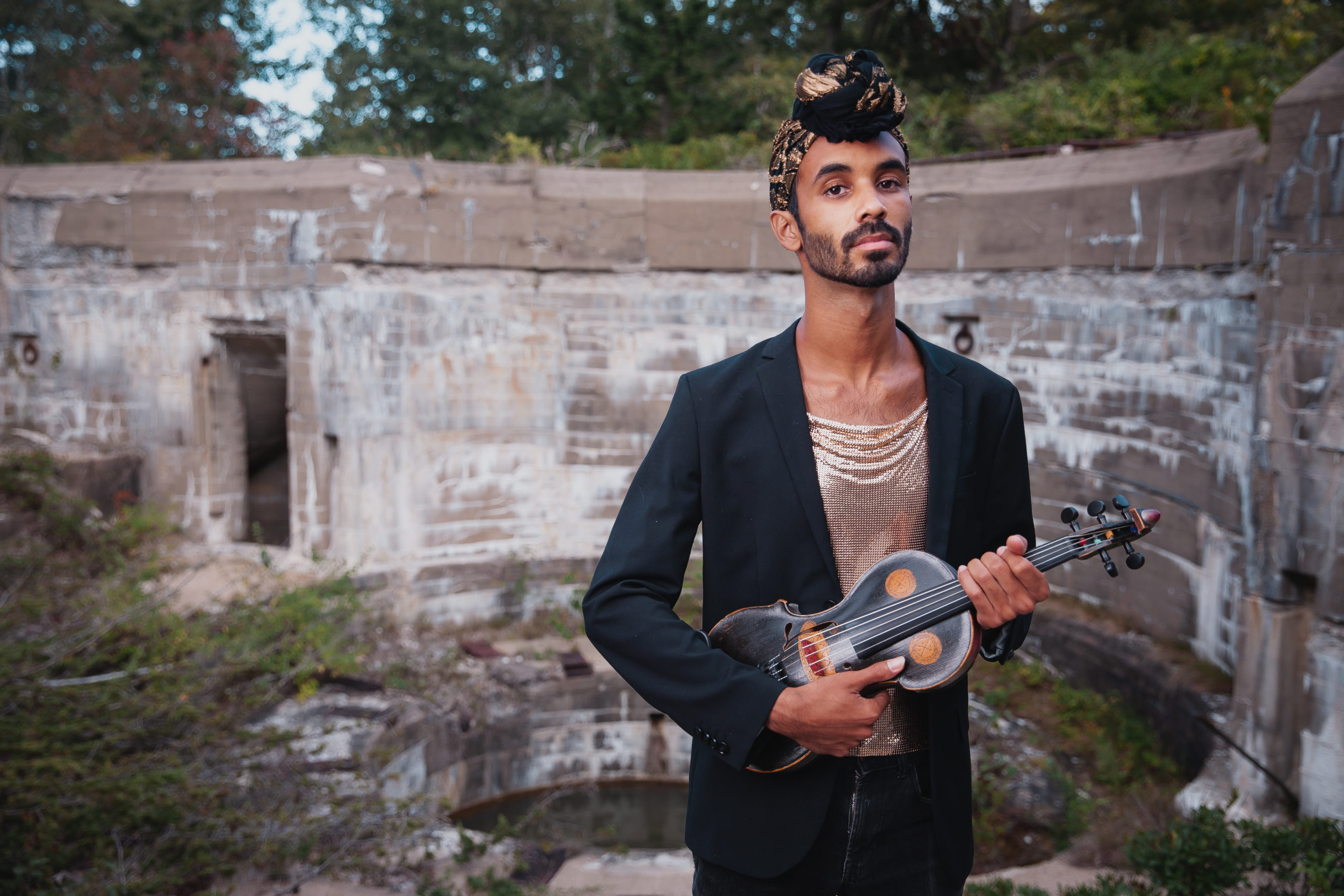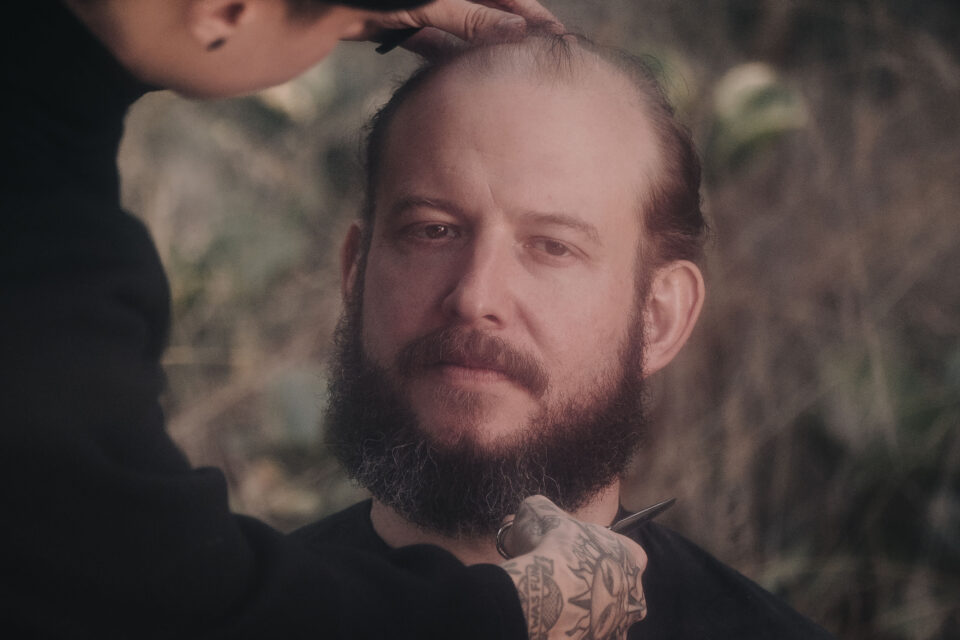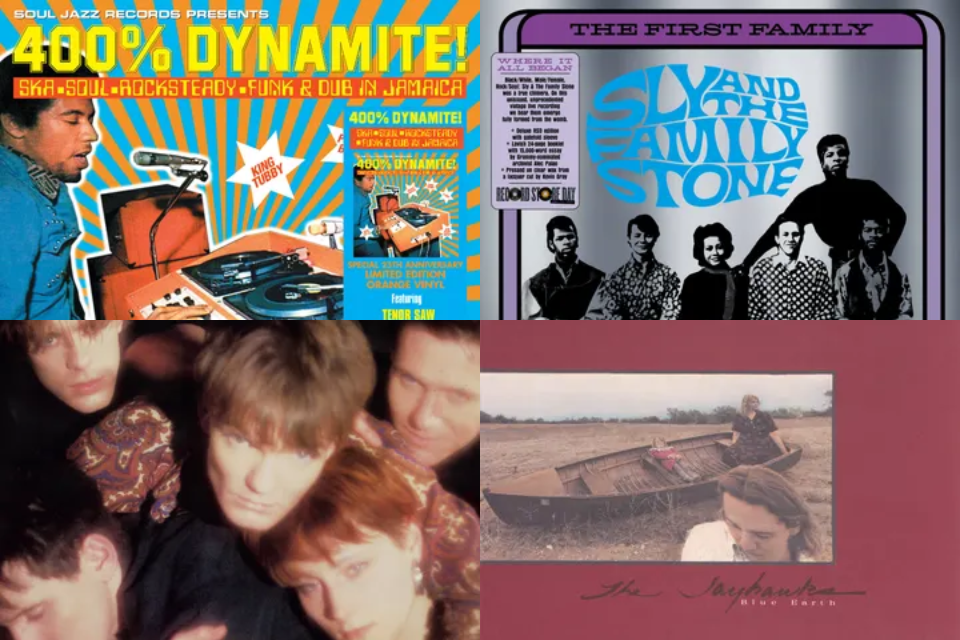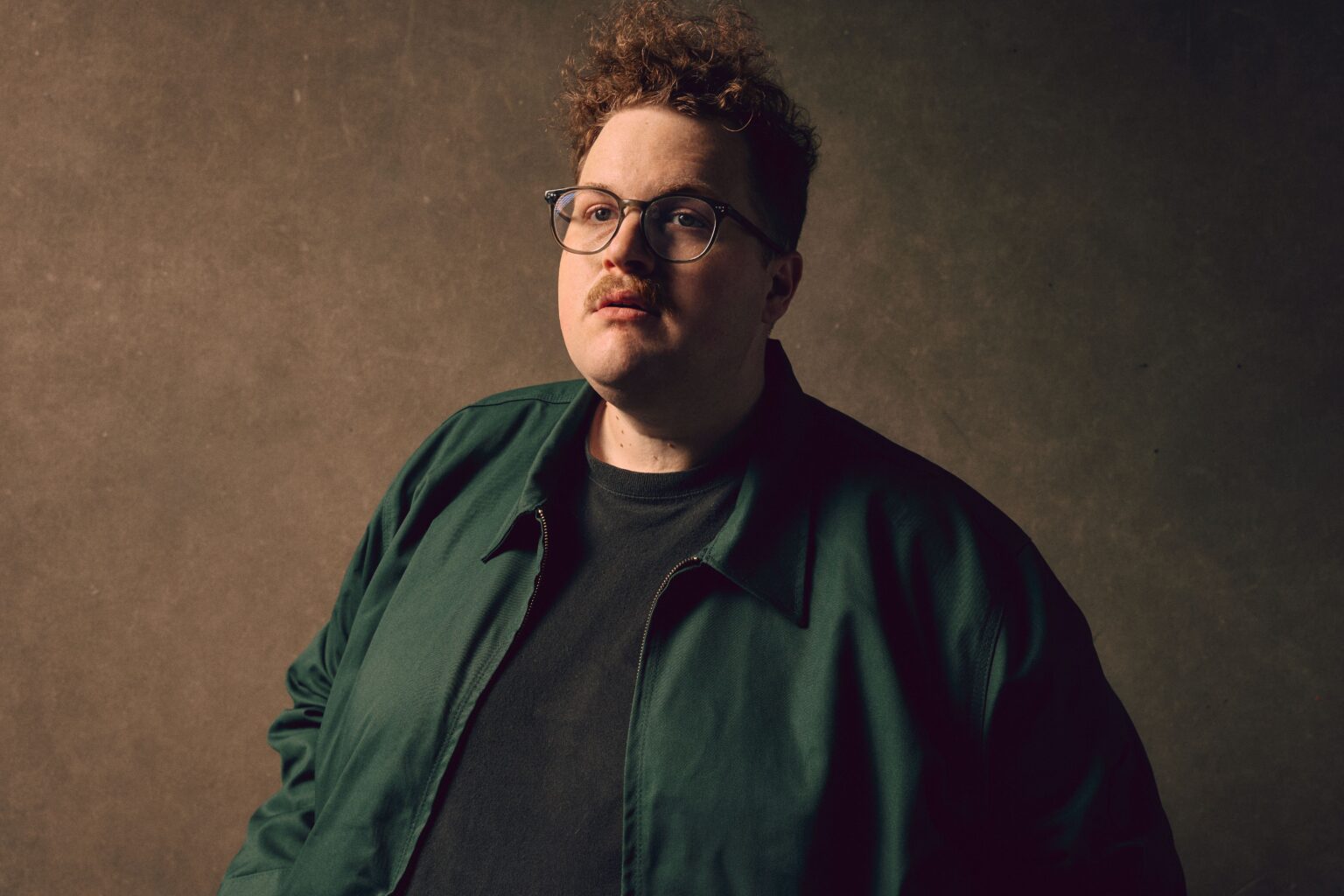On the Record: A Q&A with Jake Blount
Jewly Hight: When you’re performing, sharing your work, your recordings, you are often coming up against perceptions of history which are very incomplete or whitewashed, read through a heteronormative lens. That means that you’re also doing the work of educating people about Black string band traditions, the West African origins of the banjo, the contributions of indigenous and queer folks. I wonder how you look at that kind of labor, and what your priorities have been.
Jake Blount: I think it’s shifted over time. I think when I started out with [the EP] Reparations and [debut album] Spider Tales, both of those were, in my mind, very outwardly focused releases that were about showing to the world that this lineage was there.
In the case of Reparations, I really just wanted to make a statement about how many people there were, because obviously the Carolina Chocolate Drops opened this conversation. I would not be having the conversation if they had not started it, but they were really focused on one particular regional repertoire, for the most part. I wanted to extend a little beyond that and think about the connections between Black and indigenous communities and the ways in which Black people in different parts of the country were playing this music because regional flavor plays such a strong role in the way that the music comes across.
Spider Tales, I think, was my first attempt to theorize around that material. So rather than just saying, “These people were here; We are here,” it was about what is being said in those old songs. For me, it was more of an exploration into what those songs mean, why I like them, not being born in the era that they come from, and wanting people to understand that there may be more depth in those songs and in those tunes than we’ve been led to believe there is.
I think The New Faith is sort of an extension of that, where I feel like I’ve done a lot of analytical work and a lot of research into these old traditions, and [this] was me starting to embrace creative license. And I hesitate to say that it was me starting to take creative license, because I’ve been doing that the whole time. I think it probably comes across as a departure in some ways because it’s not as educationally focused. Like this isn’t a didactic album. That’s not what I was trying to do with it.
I’ve come to understand that the way that we learn from these old recordings and the way that we try to remake these old traditions is not all that different from imagining something that’s an equivalent amount of time in the future. And when I’m learning those old songs off of those old recordings, I’m learning through technology, right? In the case of some of those old recordings, I’m imitating the sound of the tape or the disc or the wax cylinder as much as I’m imitating the musician. It’s been really interesting to think about the technology as an intermediary there, and that I have this one tiny fragment of time and I’m building this whole narrative and story and context around it with other information that I have.
Over time, I’ve gone from feeling like I’m doing the work of educating people about this stuff to feeling like I am exploring its significance to me and to other people like me, and that doesn’t feel as much like labor.It feels like I’m learning and exploring in a way that benefits me as well as, hopefully, the people who listen to it.
JH: So much of your previous work that we’re talking about is grounded in the present, but looking backward. And yet, when you did your most focused study of these old songs to date, that got you looking toward the future. How did that happen when you started to delve in?
JB: I’ve always been a big fan of speculative fiction, sci-fi and fantasy. I’ve always wanted to work in that medium in some way, shape or form.
I think I reached the point over the pandemic of realizing I already have a flavor for what a few centuries of progression in this style looks like. Certainly, I don’t know everything that’s going to happen in the future. There could be a lot of curveballs. Who knows? But it didn’t feel that out of bounds to try to project another couple hundred years and to use that as a way to sort of question the linear model of time and progress that we’ve been sold, because of, you know, the European-descendant society that we live in. Maybe our technological development and our sociopolitical development will not be in a straight line. It felt real to say the future might look a lot like the past.
It’s striking to me that this venture into the future involved working with the oldest stuff that I’ve worked with. I have a banjo tune from 1688 on this record. When I do the live show, I’m reciting poetry from the 1700s, from the first Black poet ever published in North America. So there’s tie-ins that reach forward and back all at the same time. To me, it isn’t really feeling like a different task—it’s feeling like another piece of the same endeavor.
JH: You dedicated the album to two important figures in Afrofuturistic literature, Octavia Butler and N.K. Jemisin. But when I was thinking about how Afrofuturism has manifested itself in music, through Parliament-Funkadelic and Sun Ra, LaBelle, Digable Planets, and here in Nashville, Namir Blade, it’s this gleaming, technological fantasy, often even in the costuming, in the production, imagining worlds that exist beyond what we know now. Did you have in mind any sort of musical precedent for what you wanted to do?
JB: I think that was partly a generational thing, in that a lot of the foundational Afrofuturist musicians came of age or were working during the space race. That was something that was at the front of a lot of people’s minds at the time. Like, “we’re going into space, we’re putting people on the moon, we’re sending rovers to Mars.” That was still happening when I was young, but the arc over my life has been the gradual defunding of NASA and the privatization of space exploration and things like that. It doesn’t feel as within reach to me as I think it did for a lot of them. So my vision of the future will look different, but the way that we interact with the present greatly informs the way we think about the days to come.
I would say I leaned quite heavily on literature going into this, because I think I haven’t heard [anything comparable] within music. That’s not to say it’s not there. I haven’t heard a reflection of the type of future I see coming down the pipe in the immediate sense.
Certainly there’s a lot of Afrofuturist music out there that has this very dark underbelly. If I think about [Funkadelic’s “Maggot Brain”], “I have tasted the maggots in the mind of the universe,” there’s a lot of darkness within that. And I don’t think that space travel is always a triumphant thing. I feel that part of what Afrofuturism can do is question whether the future looks like progress as envisioned by European white society, that perhaps the wheel is still turning, that we’re moving in circles, in cycles. I’ve read a lot of literature that embraces that or at least asks those questions or maybe even does both at the same time, like Octavia Butler’s “Xenogenesis Trilogy,” where there’s simultaneously this very technologically advanced, alien way of doing things and also this very, “We’ve lost most of what we have and we’re having to rebuild society from the ground,” thing.
But I don’t know that I found a forerunner for exactly what it is I was trying to do, and I guess that made me more determined to do it.
JH: I’m aware of how tricky it can be to make claims about firsts, but this is definitely the first concept album I’ve encountered from an artist working in roots music that’s Afrofuturistic in its outlook.
JB: Having read the things that I’ve read about Afrofuturism in the creation of this album, I think that you could actually put a lot of Black roots music under the Afrofuturist umbrella and it would fit reasonably well.
I’m reading this book right now called Afrofuturism Rising by Isiah Lavender. He talks a lot about how slave narratives in these early literary accounts that we have actually can be read through an Afrofuturist lens and understood to be working in the same ways at the time that Afrofuturist texts work today. It’s an interesting take and I’m still working through how exactly it applies to music. He talks about it in a very interesting way, which is that Black people have used art and cultural traditions to create what he calls a networked consciousness, where we are able to connect to one another and feed into and get information from one another through these things that we share.
The more that you think about the very beginning of these songs and this musical tradition, that these are folks who were envisioned as something other than human, who were used as machines or appliances during their lives that were using these songs to pass information to one another in code that could only be perceived by this specific set of people who were understood to be built in a different way, it’s like androids communicating through electronics. I think you get to the heart of where Janelle Monae’s thing comes from. The android is present.
I agree with you: Mine may be the first thing that I’ve encountered that is working with this old material that brands itself as Afrofuturist, that is self-consciously Afrofuturist. But I think the way that this stuff functions is deeply Afrofuturist and that always these songs were about envisioning a different future and envisioning a brighter day ahead and creating hope to share with other people in the networked consciousness. It’s all been there the whole time. And the more I think about that and go back and listen to other stuff, the more I’m realizing that I am far from the first and far from alone.
JH: You mentioned Carolina Chocolate Drops a minute ago. They created a template for bringing elements of hip-hop, rapping and beatboxing alongside string band tradition. On this album, you’ve worked with a rapper for what I believe is the first time. You feature Demeanor prominently on a number of tracks, even foreground him as an additional narrator in a way. Why was that something that you wanted to do with this album?
JB: When I first conceptualized the album, part of the thing I had to grapple with was that the characters performing the music would have heard, at least embedded within their oral tradition, echoes of everything that we’ve heard up until this point our current artistic practices, although probably they couldn’t exist the way that they do now, because the technology wouldn’t be there.
So I think about the traditional music that I grew up around and with. There were Go-go bands, there were hardcore bands. There’s a lot in D.C. that that I grew up around that I would consider folk music. But the thing that everybody did was rap. You listened to rap music, your friends made rap music. After school you go to a cypher. That was the thing that was around.
It’s impossible for me, after the past 30 to 50 years, to imagine a future for Black music where rap is not foregrounded, because that’s the biggest flavor in what we’re doing right now. And presumably even if you’re thinking a couple of centuries down the line, the influence of jazz is not gone in our music, the influence of spirituals is not gone in our music. That’s not to say those aren’t still extant forms of music, but they’re not the dominant vernacular anymore.
So observing those cycles, I knew that rap had to be a part of the process. I knew that rap had to be a part of the project in a big way. I knew Demeanor would be the right guy to do it. I mean, it’s hard to find a rapper that you can send this banjo track to and be like, “Make a verse to this.” But I knew he could do it, because he’s done it before. He grew up around this stuff. He knows what it’s all about. And he just he did an incredible job.
JH: You do a lot of speaking on the album, but it’s not rapping. It’s more what I would think of as oratory or recitation or liturgy. Who is that narrator? How do you envision that role that you’re inhabiting?
JB: That was one of the trickier parts for me. I knew that I wanted that to be a piece of it, because I modeled the whole album off of these old recordings of Black religious services that, like the Lomax’s made, other folklorists made from back in the day. Oftentimes in those, there will be included a track of everybody humming and somebody speaking a prayer at the same time. And that was something I really wanted to be present. It occurred to me that it would be a really good way to set the stage a little bit for what the album is about.
So the first thing I did when I was making a demo for the album, so I could sell Folkways on the idea, was I did the “Take Me to the Water” and [spoken track] “Prayer” and “The Downward Road” sequence. [For “Prayer”] I did what I heard on the recording; there was humming and somebody’s speaking over the humming, and that’s how it worked.
The other stuff came about as the structure of the record started to reveal itself, and the songs kind of started to group themselves into categories. I realized I had to break up the categories and that that was a good way to provide a little bit more information and world-building.
But the approach was something I had a lot of questions about, because I have a lot of misgivings about me trying to represent a Black preacher. People spend years studying how to do that. It’s an art form unto itself that I have not studied. I have an uncle that’s a minister and there’s a whole thing that he does that I can’t do it. I knew I wanted there to be lineage to that. But also part of the idea of the [field recording of] musical performance, which was not as tight and perfect as it could have been on a recorded album, was that these are people who haven’t gone to school for this stuff. They’ve learned to do it in their community.
And what other things would have been passed down in the oratory tradition than just the raw Black preacher sound that we’re so familiar with? People have been listening to monologues in movies and TV this whole time, so I tried to blend elements of the delivery that I’ve heard, like in my grandparents church or on recordings or whatever with movie or TV [spoken] delivery that I found really compelling. We’ll see whether other people find it compelling. This was definitely a flying by the seat of my pants thing, but it was another uncomfortable place that this album concept forced me to go.




